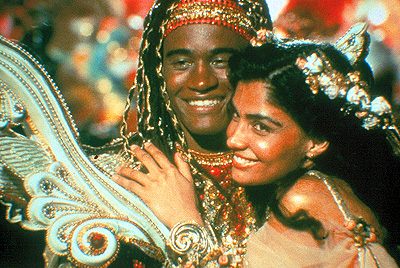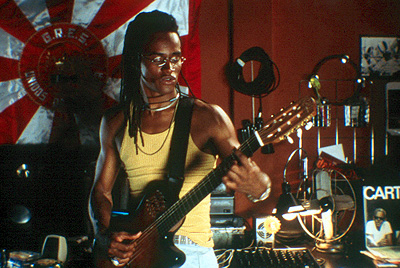Orfeu


In the Greek tale of Orpheus, his beloved Eurydice dies and goes to Hades. Orpheus is a great musician, and is despondent over his loss. He goes to Hades and Persephone, and they agree that he can escort her out of Hades as long as she follows him and he does not look back. He resists for most of the way, but finally looks back, losing her forever. Orfeu is the second movie to retell the tale of Orpheus set amidst the Caranval in Brazil. Orfeu Negro, the first one, came out decades ago. According to director Carlos Diegues, Orfeu is not a remake, but a retelling.
Orfeu (Toni Garrido, lead singer of Brazilian group Cidale Negra) is the most famous samba player in Brazil. The samba school, under his direction, won the past two Carnavals. Everybody loves him, and no one understands why he chooses to lives in the slums in the hills outside Rio, among the drug dealers and the poor. Euridice (Patricia Franca, Tetia) moves to the slums from a rural area. Orfeu immediately sets his sights on Euridice. He is self-confident almost to the point of arrogance, and persistent, and she reluctantly enters a relationship with him. Orfeu dated many of the women in the area, but Euridice is different. She makes him want to settle down, move away, and start a family. Remember, this is the myth of Orpheus, so drug dealer Lucinho (Murilo Benicio, Os Matadores) ends up murdering her.
The contrast between the abject poverty of the slum and the opulence of the Carnaval is stunning. Diegues filmed actual Carnaval festivities, complete with music and elaborate costumes. Meanwhile, Orfeu and everybody around him live in cramped, ramshackle tenements that look like they will collapse at a moment's notice. He says he lives there to show people that somebody can succeed. He also serves to keep Lucinho's power in check. They were friends long ago, but took vastly different paths. The other attention-getter is Caetano Veloso's music. Veloso, the 2000 Grammy winner for Best World Album fills Orfeu with beautiful music. Orfeu plays his music before dawn, and children believe his music causes the sun to rise. Women inspire him to write beautiful love songs, which the entire slum can hear.
If anything, not enough of Carnaval appears on screen. The focus is mostly on the growing relationship between Orfeu and Euridice. Diegues portrays Orfeu as a ladies man, so watching Euridice change him is more powerful. It is interesting to note that people within in the movie comment that every woman was at one time Orfeu's lady, but no one seems to mind. Euridice is a very simple character. She comes from a more innocent place, and everything here is different and not necessarily better. France plays her with wide-eyed wonder. Garrido has a beautiful voice, but also seems mildly absent. Orfeu mostly pines after Euridice. He also chases women. This does not give him much depth. Diegues also changes the legend of Orpheus. For one, a descent into hell does not fit in with the story. So Orfeu makes a more literal descent to try to retrieve Euridice. The ending is also not as poignant as the original legend, but there is a sense of loss present. If anything, Orfeu takes Orpheus as its inspiration, and moves on from there.